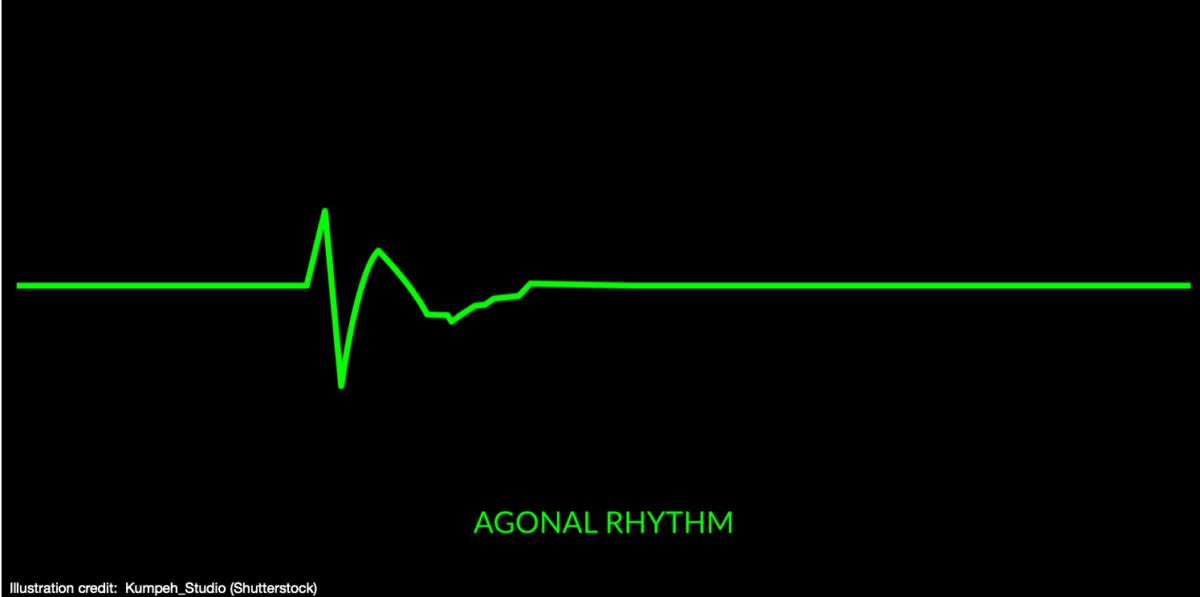Today is the first day of December. At the moment, many Americans are nervously awaiting the arrival of the Omicron strain of the SARS-COV-2 virus. We’re told that it may very well evade the immune response in our bodies conferred by the vaccine. Some citizens are more bothered by the prospect of having to wear masks and the odds of another lockdown. But other Americans don’t care one way or another about Omicrom. They think they are invincible, or it will not happen to them, and they don’t mind risking the health and safety of others to prove their point. They may believe that they don’t need the vaccines because God will protect them. Still other people are most likely very fearful of what “might” happen as Christmas approaches. In that case, COVID might be the least of their worries. In this post I examine the correlation of fear and heart failure in Luke.
Big Yipes
The Bible warns us about fear. The verse I’ll be discussing is Luke 21:26 where Jesus begins “Men’s hearts failing them for fear…” Besides writing about fear, I’ll also discuss heart failure and stress and the relationship between fear and potentially lethal cardiac events, and I hope to conclude with some helpful, healthy hints onstress reduction and how Christians can overcome these stressors in life rather than face pump failute (i.e., CHF.)
Luke, of course, was a physician himself. He did not have access to sonography or EKGs, or even electricity. He personally had no knowledge of blood chemistry, enzymes, and so on. But physicians weren’t completely in the dark, though some were more learned and sophisticated than others. I suppose that’s true today, too.
Definition of φόβος
In the New Testament, fear (φόβος) can mean one of three things, according to author William Barclay. It can mean “panic” or “flight” as Homer uses it in the Iliad (“Thus kept the Trojans watch, but the Achaeans were holden of wondrous panic, the handmaid of numbing fear–φόβος–and with grief intolerable were all the noblest stricken.”) Or, it can mean “fear” as we refer to it today, perhaps a fearful encounter with a bear. Finally, it can mean awe. Barclay cites Luke 21:26 in his definition to say “It is used of the feelings of men in the midst of the shattering events of the last days” (“New Testament Words”, p. 227 passim.) True, Jesus was speaking of the last days in Luke, 21. Whether or not these are the last days anymore than the last days of John Wesley or of Augustine or Luke, himself, is beside the point.

The word φόβος describes a gnawing fear, one that boxes you in with no escape, like finding yourself hanging on a clift by your fingernails after the ledge has collapsed and you’re unable to even try to save yourself. It is the deer-in-the-headlight fear as events spin out of control, and you want to hide in your closet or under your bed.
Some translations use the term “faint” rather than “fail” to describe the word “fear” here. But why would fainting (i.e., passing out) be even worth mentioning in a context where the sky is falling, when perhaps our cities are being nuked and the end of the world seems imminently near? So, I’m persuaded that the literal meaning is not only reasonable here, it is also the correct meaning. Some people will be so stressed during the last day that they will give up the ghost out of fear.
Fear as a precusor to potentially lethal heart arythmias
Words like “anxiety” or “angst” are used today interchangeably with fear. Likely, every one has been scared at some point and some people live in fear 24/7. It can be a small child who lives in fear of being bullied on their way to school. Other children (like me many years ago) were petrified that our fifth grade teacher would call on us in class. This fear eventually went away, but came back whenever I was enrolled in a prosem in graduate school as an adult.
Some people may live in a dangerous neighborhood of a city and they are fearful about leaving their apartment. I lived in a town of perhaps only 35,000 people and a nurse I worked with was being terrified by druggies who moved in next door to her. They’d play loud music late at night to harass her, throw dead animals and drug paraphanelia over her fence into her yard, make anonymous phone calls to her, etc. She knew fear. People in overwhelming debt also know fear. More than a few investors or gamblers over the years have committed suicide rather than live in fear. God has an alternative to this, and I’ll discuss it presently.
“In instances when you’re scared, the heart muscle might stop squeezing and not pump blood as efficiently as it needs to.”
“It’s True (But Rare) That You Can Be Scared to Death,” Cleveland Clinic, October 12, 2020
In a recent health bulletin, the Cleveland Clinic noted “Intense emotion can actually trigger a heart attack in susceptible individuals (especially those suffering from other heart conditions). But even people without an underlying heart problem can literally be scared (almost) to death.
There is an adrenaline rush when you are scared, the so called “fight or flight” syndrome. The Clinic warns:
“Whether you stay or go, all of this begins to affect the heart’s electrical system. It can cause arrhythmia, constriction of blood vessels (even when there aren’t blockages) or spasms. This is what can cause heart function to decline or fail. In instances when you’re scared, the heart muscle might stop squeezing and not pump blood as efficiently as it needs to.”
“It’s True (But Rare) That You Can Be Scared to Death,” Cleveland Clinic, October 12, 2020
Cardiologist Mark Estes of the University of Pittsburg Medical Center elaborates up on this thought:
“The human mind and the human body do have the ability to prepare themselves for situations that can be anticipated that might be stressful and generally handle them much, much better,” Estes said. “It is the sudden, unexpected things which tend to cause a dramatic increase in heart rate and blood pressure and put people with pre-existing cardiovascular disease at risk.”
American Heart Association
Unexpected things. Like stars falling from the sky (Matthew 24:29), or the sound of trumpets (Matthew 24:31.)
Essential Electrophysiology
Your heart is primarily made up of skeletal muscle with some valves, tendons, etc. When you stick your finger in a light socket (and I am in no way encouraging anyone to do so), the electricity causes your muscles to tense up. Electricity causes your heart muscles to do the same, and this contraction is what circulates the blood in your body. You body depends on a certain rate and rhythm of contractions to supply blood and thereby oxygen to your vital organs. Signals are sent to your heart to beat via the autonomous nervous system, so your heart continues to beat when you are asleep. But not every heart is perfect. Like other organs and parts of your body (hips, knees, brain, bladder), “stuff happens” and the entrophy causes a depreciated function. With the heart, beats may become erratic, perhaps even momentariy absent, heart rate accelerates, and so on. Getting scared out of your wits can cause your heart rate to become erratic or to cease. Cardiac interruptus. A more or less constant level of stress (fear) can also produce dangerous changes to your heart over time via high blood pressure.
When Jesus speaks of hearts failing, it might be a reference to Congestive Heart Failure (CHF) where the heart can no longer pump blood sufficiently and it backs up into the lungs, making it difficult to breathe. The person’s legs swell, too. This was called “dropsy” in the old days, and digitalis found in Foxglove plants was the treatment. Jesus could also mean an agonal rhythm, asystole, ventricular fibrillation or some other conduction issue that keep the heart from beating normally, though I don’t think He was splitting hairs here.

Nor am I sure why Jesus was so graphic and precise in Chapter 21 of Luke. Maybe He wanted to “scare people straight1” but He likely wanted to punctuate the seriousness of the events surrounding the second coming. I remember reading a novel about a clash between a U.S. and Russian submarine. Perhaps it was Mark Joseph’s book “To Kill the Potemkin.” During the last few pages, the U.S. sub commander miscalculates, and a torpedo heads right towards him. People are asking him for orders but he was frozen with fear. Meanwhile, the XO steps forward to take command but immediately collapses on deck with a coronary, and the sub is destroyed seconds afterwards. These trained officers and crew were amped up by the search and destroy maneuvers and their hearts gave way (or the XO’s heart anyway.)
So, like many other people, I have some phobias. A fear of falling. I can fly in a plane without any problem, but I can’t climb a step ladder. Thankfully, my phobias don’t keep me from doing my job or getting out of bed every morning, so I don’t really feel a need to confront them. But if they did, I would have to. When I was a department chair at my college, a person called me once to enquire about a teaching position. She had a Ph.D. in psychology and wanted to teach, but she only wanted online classes. I told her that if she was selected by the search committee, she could teach some online classes, but would have to teach traditional classes as well. She said she had an overpowering fear of being in the classroom (agoraphobia or some other issue) and could not do that. I don’t know of any college or university that would accommodate those preferences for a full time employee. That iteration of fear needs to be addressed if that person hopes to make use of a Ph.D. in a traditional teaching setting (in psychology, no less.)
Sometimes fears can almost be amusing to hear about. Speaking of psychology classes, a co-ed in one intro class told her classmates about her boyfriend who was afraid of making left hand turns while driving. If he needed to make a left turn at a certain intersection, he would proceed to the next intersection and complete three right hand turns, doubling back around the block to avoid making a left turn. Sometimes that is not possible to do, however.
There are a number of helpful Bible verses that deal with fear, anxiety, and stress. Just as fear paralyzed the captain of the submarine in the book above, it can paralyze you. I assisted a doctor once who would have to periodically cover the ER of a small hospital that I worked at. If someone had a knife in his liver, or a gunshot wound to the abdomen, or status epilepticus, this doc was your “go to” guy. But he could not bring himself to treat a suspected myocardial infarction for some reason, and the nurses and techs could not proceed without his orders. It got to the point that ambulances would call ahead to see what doctor was working that night before they decided what hospital to take the patient to.
Jesus can help you with your fears
In Joshua 1:9 we read “Be strong and courageous. Do not be frightened, and do not be dismayed, for the Lord your God is with you wherever you go.” King David says in Psalms “I sought the Lord, and he answered me and delivered me from all my fears” (34:4.). If the Lord did this for David, would He not do this for you?Psalm 118:6 says “The Lord is on my side; I will not fear. What can man do to me?” In other words, if God be for us, who can be against us. For many years during the Cold War, the U.S. maintained a small garrison in West Berlin. These few hundred soldiers kept the hundreds of thousands of Warsaw Pact soldiers from pouring into the West, because our opponents understood that the full military force of the U.S. and our allies were backing them.
When I was stationed in Vietnam, Psalm 23 helped me. Other passages may minister to you. In Deuteronomy 31:8, Moses writes:” The LORD himself goes before you and will be with you; he will never leave you nor forsake you. Do not be afraid; do not be discouraged.” Remember in Matthew 14:22-33 when Jesus walked on the water during the storm, rescuing Peter when fear overcame Peters faith? Your Savior is present with you even at this very moment, when things are the darkest in your life. All you have to do is reach out to him.

Here are some life hacks for dealing with stress and anxiety until Jesus returns or things get really weird.
Footnotes
1I do not intend to suggest that a person is saved through rehabilitation or reforming their life. That is not what the Gospel teaches. My intent was to say that people can commit themselves to being disciples as the Holy Spirit prompts them (or they can resist the Spirit of God.)
Citations
Barclay, William “New Testament Words,” Louisville: Westminster, John Know Press. 1974.




